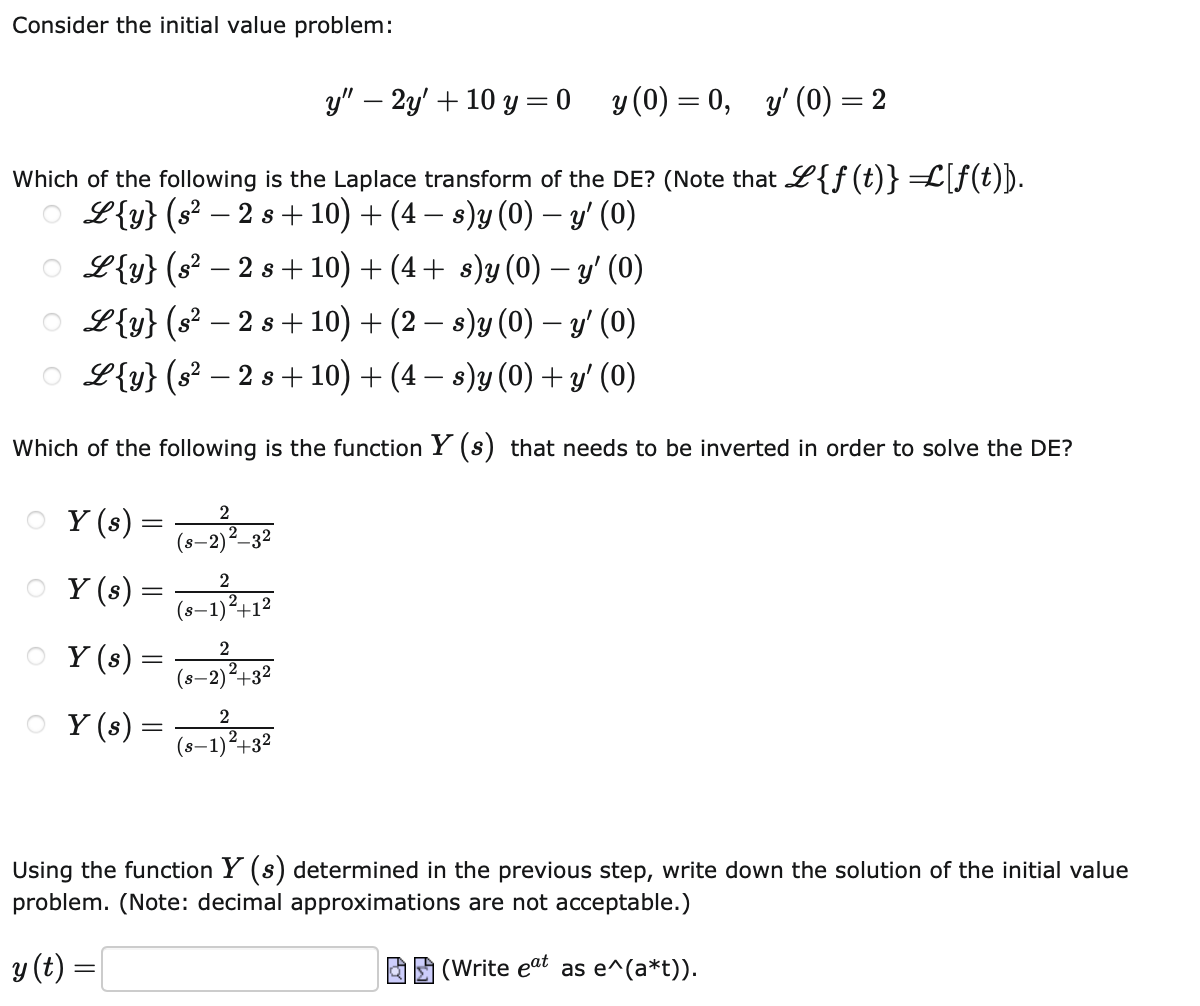Consider the initial value problem: y" – 2y' + 10 y = 0 y (0) = 0, y' (0) = 2 %3D Which of the following is the Laplace transform of the DE? (Note that L{f(t)} =L[f(t)). O L{y} (s² – 2 s+ 10) + (4 – s)y (0) – y' (0) O L{y} (s² – 2 s+ 10) + (4+ s)y (0) – y' (0) O L{y} (s² – 2 s+ 10) + (2 – s)y (0) – y' (0) o L{y} (s² – 2 s+ 10) + (4 – s)y (0) + y' (0) Which of the following is the function Y (s) that needs to be inverted in order to solve the DE? O Y (s) = 2 (8-2) 2-32 Ο Υ() - 2 (8–1)+12 O Y (s) = 2 (s–2)²+32 O Y (s) (s–1)²+32 Using the function Y (s) determined in the previous step, write down the solution of the initial value problem. (Note: decimal approximations are not acceptable.) y (t) = (Write eat as e^(a*t)).
Consider the initial value problem: y" – 2y' + 10 y = 0 y (0) = 0, y' (0) = 2 %3D Which of the following is the Laplace transform of the DE? (Note that L{f(t)} =L[f(t)). O L{y} (s² – 2 s+ 10) + (4 – s)y (0) – y' (0) O L{y} (s² – 2 s+ 10) + (4+ s)y (0) – y' (0) O L{y} (s² – 2 s+ 10) + (2 – s)y (0) – y' (0) o L{y} (s² – 2 s+ 10) + (4 – s)y (0) + y' (0) Which of the following is the function Y (s) that needs to be inverted in order to solve the DE? O Y (s) = 2 (8-2) 2-32 Ο Υ() - 2 (8–1)+12 O Y (s) = 2 (s–2)²+32 O Y (s) (s–1)²+32 Using the function Y (s) determined in the previous step, write down the solution of the initial value problem. (Note: decimal approximations are not acceptable.) y (t) = (Write eat as e^(a*t)).
Advanced Engineering Mathematics
10th Edition
ISBN:9780470458365
Author:Erwin Kreyszig
Publisher:Erwin Kreyszig
Chapter2: Second-order Linear Odes
Section: Chapter Questions
Problem 1RQ
Related questions
Question

Transcribed Image Text:Consider the initial value problem:
y" – 2y' + 10 y =0 y(0) = 0, y' (0) = 2
Which of the following is the Laplace transform of the DE? (Note that L{f(t)}=L[f(t)).
L{y} (s² – 2 s + 10) + (4 – s)y (0) – y' (0)
O L{y} (s² – 2 s+ 10) + (4+ s)y (0) – y' (0)
O L{y} (s² – 2 s+ 10) + (2 – s)y (0) – y' (0)
O L{y} (s² – 2 s+ 10) + (4 – s)y (0) + y' (0)
Which of the following is the function Y (s) that needs to be inverted in order to solve the DE?
O Y (s) =
2
(s-2
-32
Y (s) =
2
(8-1)+12
O Y (s) =
(8–2)+32
Y (8) =
(s–1)²+3²
Using the function Y (s) determined in the previous step, write down the solution of the initial value
problem. (Note: decimal approximations are not acceptable.)
y (t) =
EE (Write eat as e^(a*t)).
Expert Solution
This question has been solved!
Explore an expertly crafted, step-by-step solution for a thorough understanding of key concepts.
Step by step
Solved in 3 steps with 3 images

Recommended textbooks for you

Advanced Engineering Mathematics
Advanced Math
ISBN:
9780470458365
Author:
Erwin Kreyszig
Publisher:
Wiley, John & Sons, Incorporated

Numerical Methods for Engineers
Advanced Math
ISBN:
9780073397924
Author:
Steven C. Chapra Dr., Raymond P. Canale
Publisher:
McGraw-Hill Education

Introductory Mathematics for Engineering Applicat…
Advanced Math
ISBN:
9781118141809
Author:
Nathan Klingbeil
Publisher:
WILEY

Advanced Engineering Mathematics
Advanced Math
ISBN:
9780470458365
Author:
Erwin Kreyszig
Publisher:
Wiley, John & Sons, Incorporated

Numerical Methods for Engineers
Advanced Math
ISBN:
9780073397924
Author:
Steven C. Chapra Dr., Raymond P. Canale
Publisher:
McGraw-Hill Education

Introductory Mathematics for Engineering Applicat…
Advanced Math
ISBN:
9781118141809
Author:
Nathan Klingbeil
Publisher:
WILEY

Mathematics For Machine Technology
Advanced Math
ISBN:
9781337798310
Author:
Peterson, John.
Publisher:
Cengage Learning,

